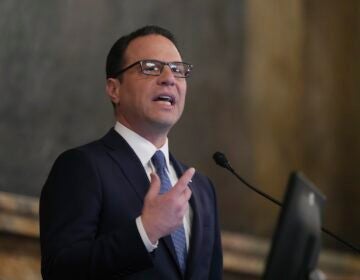Breaking the Pa. budget impasse hinged on ditching a major climate initiative
The Regional Greenhouse Gas Initiative would have put a price on carbon. Opposed by Republicans, it was sacrificed by Democrats to get the budget deal done.

File: Shown is the Pennsylvania Capitol in Harrisburg, Pa., Feb. 8, 2022 (AP Photo/Matt Rourke, File)
This story is part of the WHYY News Climate Desk, bringing you news and solutions for our changing region.
From the Poconos to the Jersey Shore to the mouth of the Delaware Bay, what do you want to know about climate change? What would you like us to cover? Get in touch.
Pennsylvania lawmakers traded a major climate initiative to break a more than four-month budget impasse, freeing up funds for public schools and social services while angering environmentalists.
Democratic state Rep. Greg Vitali, who represents parts of southeast Delaware County, criticized the backroom negotiations among leaders of both parties that led to ditching Pennsylvania’s participation in the Regional Greenhouse Gas Initiative — or RGGI.
“Frankly, it’s a typical annual budgetary dynamic where the Republicans insist on bad provisions for the environment and the Democrats are willing to exchange that for other things,” Vitali said.
RGGI, the cap-and-trade program that includes participation from a consortium of 11 mid-Atlantic and northeast states, would have forced Pennsylvania power plant operators to pay for climate-polluting emissions. Environmentalists and climate campaigners say it’s one of the best ways for the state to start tackling climate change and cut electricity prices by encouraging the use of cheaper clean energy. But Republicans called it a tax that would have forced utilities to pass on the costs to consumers, thereby raising electricity rates.
Gov. Josh Shapiro signed the $50 billion spending package Wednesday afternoon, promising in his remarks to push for clean energy projects, despite ending the six-year effort to join RGGI.
“For years, Senate Republicans have used RGGI as an excuse to stall substantive conversations about energy,” Shapiro said. “Today, that excuse is gone. It’s time to look forward and I’m going to be aggressive about pushing for policies that create more jobs in the energy sector, bring more clean energy onto the grid, and reduce the cost of energy for Pennsylvanians.”
Republican Sen. and President Pro Tempore Kim Ward, who represents parts of Westmoreland County, praised the end of the initiative as a key Republican win in her remarks to the General Assembly.
“We were able to … move the governor off of that position,” Ward said. “We are such a huge energy producer in this country. Our energy will blossom and I’m looking forward to all the jobs that creates and all the tax base that comes as a result of that.”
In addition to Republicans, fossil fuel companies, and building trades unions that work on pipelines, refineries and power plants opposed RGGI, according to the Associated Press. They said that new natural gas–fired plants would be built in other states if Pennsylvania joined the initiative.
Pennsylvania is second only to Texas when it comes to natural gas production and is the third-largest producer of coal. Joining the initiative would have made Pennsylvania the first fossil fuel producing state to do so.
The state ranks fourth in the amount of carbon emissions, although emissions have decreased with the shuttering of coal-fired power plants.
Former Democratic Gov. Tom Wolf made joining RGGI a key climate initiative when he began the process in 2019. Republicans fought the effort through legislation and the courts. The Commonwealth Court ruled against the state joining in 2023, calling it an invalid tax.
The case went to the Pennsylvania Supreme Court, which heard arguments this spring but has yet to issue a ruling.
This legislative move will likely make that case moot, said John Dernbach, emeritus professor of law at Widener University Commonwealth Law School.
“RGGI would have carried out the state’s responsibility under the [state Constitution’s Environmental Rights Amendment] to maintain a stable climate,” Dernbach said. “That constitutional duty still exists.”
It also marks the first time a state legislature has ever pulled out of the program, said PennEnvironment Executive Director David Masur.
“It sets a horrible precedent and sends a horrible message to Pennsylvanians who want action to solve climate change and want to see climate solutions implemented,” Masur said. “RGGI is undoubtedly the most time-tested and successful state level program in the country for reducing global warming pollution.”
While there remains a strong disagreement over whether RGGI would decrease electricity rates, or raise them, Elizabeth Stelle, vice president of policy at the conservative think tank the Commonwealth Foundation, said it was the current rise in costs that pushed lawmakers to agree on abandoning the initiative.
“The approach of carbon taxes doesn’t accomplish its goals,” Stelle said. “All it does is leave Pennsylvanians with fewer resources, and we think we can have the best of both worlds, more affordable energy and cleaner power. Carbon taxes aren’t the way to get there.”

Get daily updates from WHYY News!
WHYY is your source for fact-based, in-depth journalism and information. As a nonprofit organization, we rely on financial support from readers like you. Please give today.







